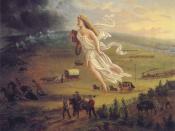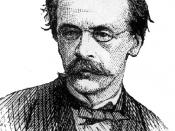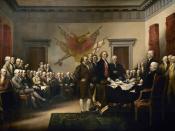The Progression of America
Since the colonial period, the concept of "American Exceptionalism" has evolved and shaped the United States into what is become today. Unfortunately it was through extreme trends of exceptionalism that our country has learned the most from and later were responsible for making the U.S. the great nation it is today. Various institutions established in our country's past show strong ambition on the part of the nation's leaders, but also speak volumes for the sense of superiority held by settlers.
In 1606 "The First Charter of Virginia" was initiated. It was the legal document allowing the Virginia Company to set up Jamestown. The charter allowed new Jamestown inhabitants to claim any land, as long as it was not "possessed by any Christian Prince or People," (1) indicating no recognition of any land previously inhabited by Native Americans. This also indicates the Indians were regarded, by the Europeans, as being savage, and non-Christian and therefore had no rights.
This "we are better than them" attitude was a common display by the new settlers toward anyone other than themselves.
Following the Jamestown settlers, the Pilgrims fled to the America's in 1620 to separate from the Church of England. Prior to landing off the coast of Cape Cod they developed the "Mayflower Compact", an abbreviated version of a constitution, which was the first form of organized self government set-up in America. The Pilgrims took every step possible to ensure the success of their Holy mission. The compact states that "having undertaken for the Glory of God, and advancement of Christian faith, and the honor of our King and country...for our better ordering and preservation,"(2) displaying their belief that their mission was supported by God and their King, which instilled in the Pilgrims a sense of righteousness and exceptionalism.


